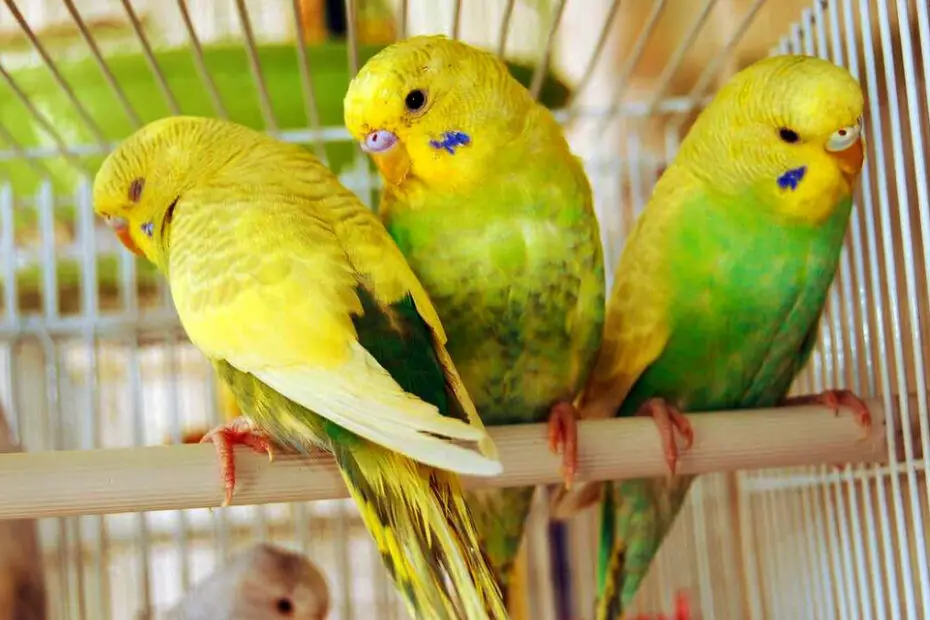Recognizing the signs and symptoms of feather plucking early is crucial. As a responsible pet owner, it’s essential to understand the causes and consequences of feather plucking and take steps to prevent it.
Feather plucking is a common issue with budgies which involves pulling out and chewing on their feathers or the feathers of other birds. The reasons behind this behavior can be lethargy, tension, anxiety, or underlying health issues.
The article offers practical solutions for each potential cause of feather plucking in budgies. That includes positive reinforcement training, addressing underlying health conditions, using bird grooming products, creating a stimulating and enriching environment, and providing proper nutrition and supplements.
If left unaddressed, feather plucking can lead to infection, scarring, and even death. Therefore, pet owners should seek veterinary care if the behavior persists or worsens, and they should seek immediate pet care if there is bleeding or signs of infection.
By understanding the underlying causes of feather plucking in budgies and taking preventative measures, pet owners can ensure their pets’ overall health and well-being. This article provides valuable information for budgie owners looking to understand and prevent feather plucking in their feathered friends.
Understanding Feather Plucking in Budgies
Feather plucking or feather picking is a behavior in which budgies (parakeets) pull out and chew on their feathers or the feathers of other birds. Feather plucking can have multiple underlying causes.
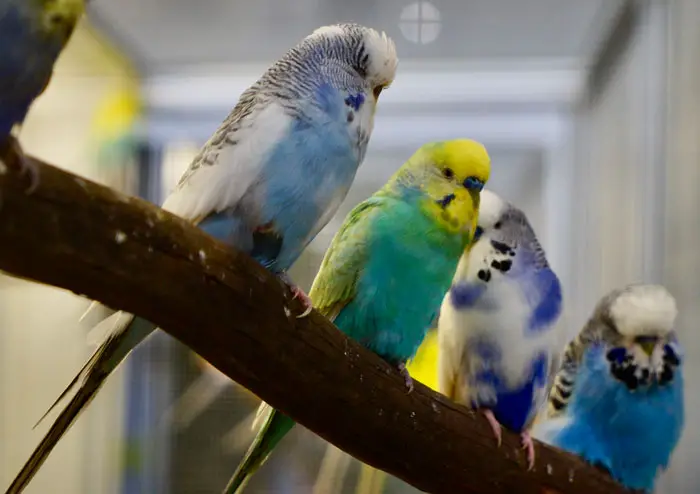
Causes Of Budgie Feather Plucking
Feather plucking can range from a mild occasional behavior to a severe, chronic problem. It can be caused by various factors, including
Stress and Anxiety
This occurs from a lack of socialization, inappropriate living conditions, or trauma. Anxiety, on the other hand, can come from fear, uncertainty, or past negative experiences.
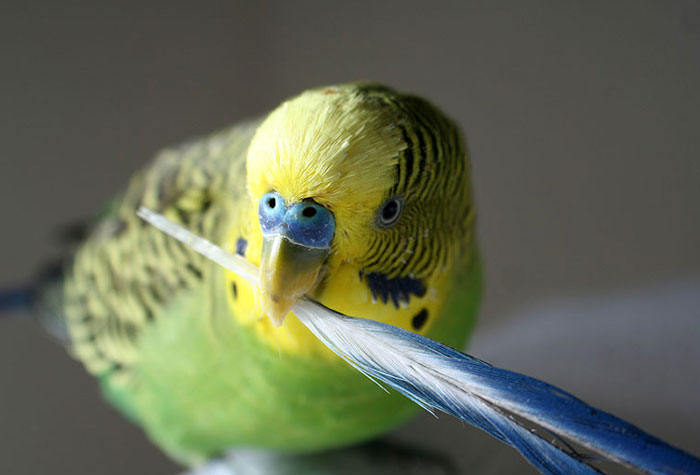
Boredom
This occurs when this bird lacks mental stimulation or is confined to a small space.
Health issues
Different budgie species and breeds may be more susceptible to feather plucking due to health issues. This includes skin irritations, infections, or parasites. Feather removal may also be an indication of a nutritional deficiency. Also, certain diseases can cause feather plucking, such as liver disease, kidney disease, or hormonal imbalances.
Breeding Behavior
Breeding pairs of parakeets may pluck each other’s feathers as part of their mating rituals.
Types Of Feather Plucking Behavior And How To Identify Them
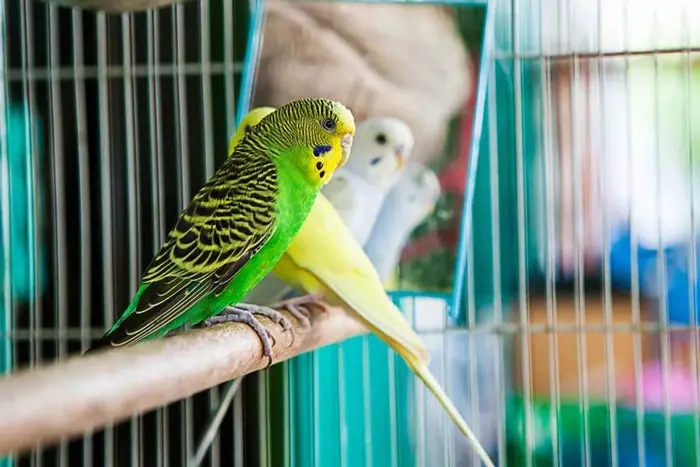
Budgie owners can address feather plucking effectively if the types of plucking behavior are well understood.
Self-plucking
This is when a bird plucks out its feathers by itself. This results in bald patches or skin injuries.
Mutual Feather Plucking
This bird behavior occurs when two or more birds pluck each other’s feathers. It is usually during social interactions or mating.
Feather destruction
This is used to describe a group of behaviors that can include feather plucking, chewing, and shredding. This behavior can be triggered by a variety of factors, including environmental stressors, nutritional deficiencies, and medical issues.
How Feather Plucking Can Affect A Budgie’s Health And Wellbeing?
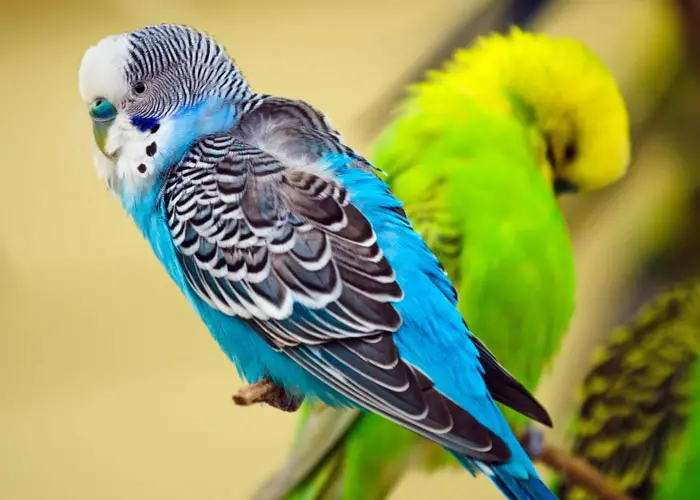
This is how feather plucking can affect budgies:
Skin Injuries And Infections
Bacteria and fungi can grow in the areas where feathers have been plucked, causing painful and potentially life-threatening infections.
Weakened Immune System
Feather contains essential nutrients such as protein and calcium. The nutrient is lost when the feather is plucked. This further weakens the bird’s immune system.
Psychological Distress
Feather plucking affects bird psychology which can lead to depression and aggression. Parakeets can have a loss of confidence, lack of appetite, or lethargy.
Reduced Quality Of Life
Plucking feathers can lead to a loss of insulation, making the bird more susceptible to temperature fluctuations. In extreme cases, feather plucking can lead to the death of this bird.
Preventing Feather Plucking in Budgies
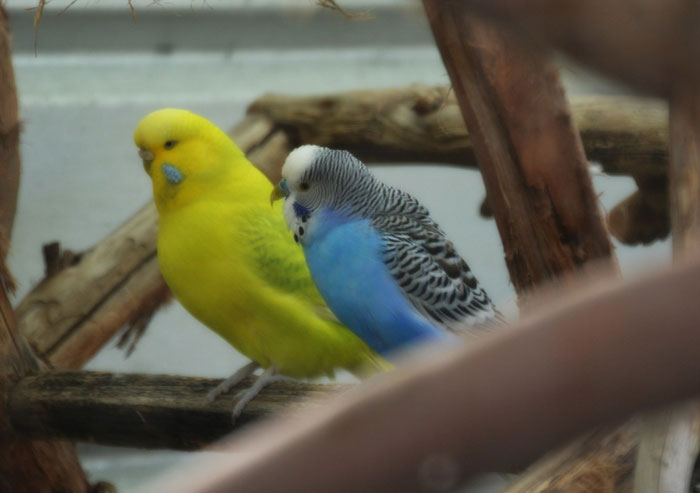
Prevention of feather plucking in budgies requires proper care and management, and here are some ways to achieve this:
- Provide proper lighting to maintain their circadian rhythm
- Provide a comfortable and stimulating environment for your budgie
- Provide proper bird nutrition and supplements
- Address medical issues promptly by taking your budgie to a veterinarian or avian specialist
- Address behavioral issues, such as tension or lethargy, by providing environmental enrichment and bird accessories, such as toys and perches
How To Create A Comfortable And Stimulating Environment For Your Budgie
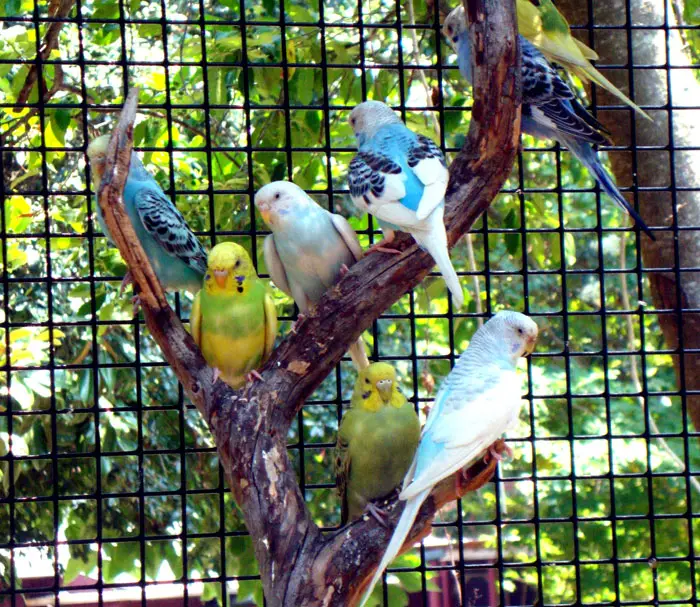
Here are some tips for creating a comfortable and stimulating environment for your bird:
Provide A Spacious And Safe Cage
Budgies need enough space to move around, stretch their wings, and exercise. So ensure that the cage is large enough to accommodate their food bowls, perches, and toys. Also, make sure that the cage is made of non-toxic materials and has no sharp edges or loose wires that can harm your budgie.
Provide Natural Light And Fresh Air
Place the cage near a window where they can get natural light for vitamin D. However, ensure that the cage is not exposed to direct sunlight, which can overheat the cage and harm your budgie.
Provide Perches
Provide a variety of perches made of different materials such as wood, rope, or even natural branches. This will not only keep your budgie’s feet healthy but also provide mental stimulation.
Provide Toys
Provide a variety of toys like swings, bells, ladders, and puzzles to keep them engaged and stimulated. Ensure that the toys are made of safe and non-toxic materials.
Provide A Balanced And Nutritious Diet
Provide a variety of fresh fruits, vegetables, and high-quality birdseed to ensure that they receive all the necessary nutrients.
Provide Socialization Opportunities
Budgies are social creatures and require socialization opportunities. Therefore, spend time with your budgie, talk to them, and even provide them with another budgie as a companion.
How To Provide Proper Nutrition And Supplements?
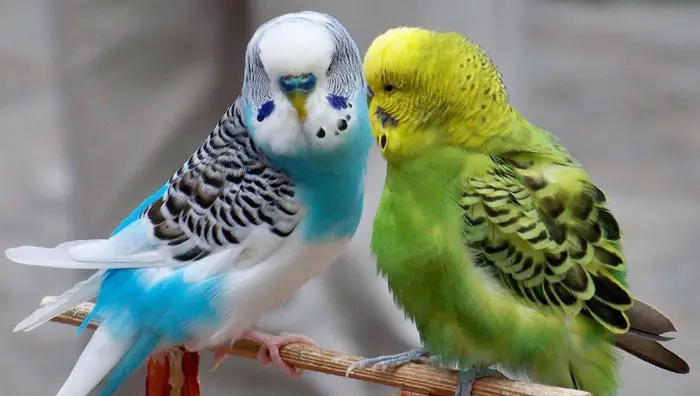
- Choose high-quality bird food. The food contains a balanced mix of seeds, grains, and pellets
- Avoid foods that are high in fat, sugar, or salt, as these can be harmful to your bird’s health
- Add fresh fruits and vegetables. Some fruits and vegetables, such as avocados and onions, can be toxic to birds. Good options include apples, bananas, grapes, carrots, and broccoli
- Further, offer a variety of grains. Budgies also require grains such as cooked brown rice, quinoa and whole wheat bread
Consider a multivitamin supplement
A high-quality multivitamin supplement can provide your budgie with additional nutrients that may be missing from their diet. If you’re unsure about the best way to provide proper bird nutrition and supplements to your budgie, talk to your veterinarian
How To Manage Stress And Anxiety In Budgies?
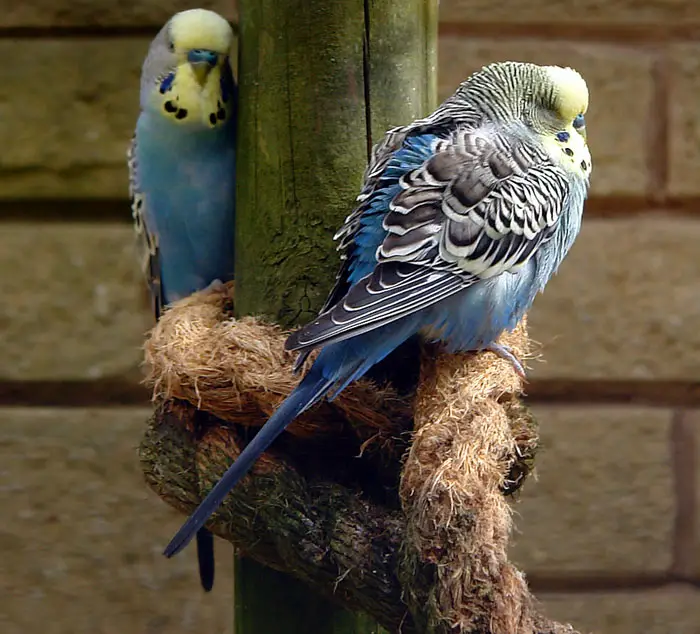
Managing stress and anxiety in budgies can be through socialization, habituation, and desensitization.
Socialization
This is a process of exposing your budgie to different people, environments, and stimuli. Socialization helps them become comfortable in different situations. Lack of socialization can lead to anxiety and destructive behavior. Socializing your budgie involves spending time with them daily, playing games, talking to them, and introducing them to other birds gradually.
Habituation
This is a gradual process to expose budgies to new situations, noises, and objects in a controlled manner. It involves starting with familiar objects and gradually introducing new ones, such as music or household sounds, to prevent overwhelming the budgie.
Desensitization
This involves gradually exposing your budgie to a stimulus that triggers anxiety or fear. While also providing positive reinforcement to help them overcome their fear. The process involves starting from a distance and slowly moving closer over time.
In the end, you reward the budgie for calm behavior with treats or praise. This technique is helpful for fears of nail clippers or the veterinarian.
Managing Feather Plucking in Budgies
Feather plucking in Budgies, or excessive preening, is a concerning behavior for bird owners. Not only does it impact the bird’s appearance, but it can also indicate underlying health or behavioral issues.
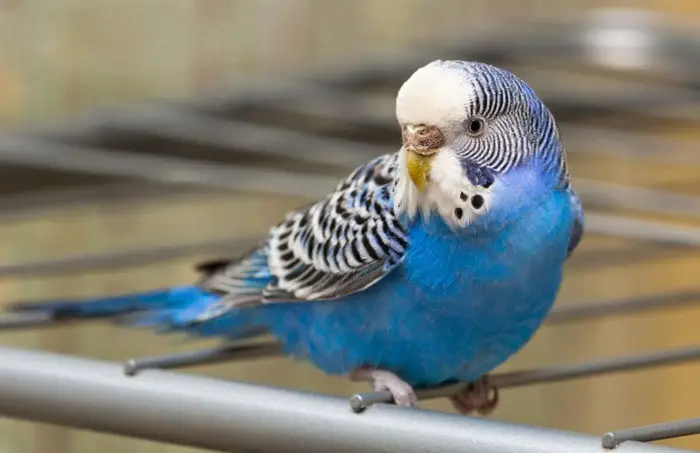
Fortunately, there are various methods to manage feather plucking in budgies, including medical and behavioral interventions. As a responsible pet owner, it’s essential to take steps to managing budgie behavior of feather plucking.
How To Address Underlying Health Conditions?
Feather plucking can be a symptom of various medical issues, such as skin infections, parasites, allergies, or nutritional deficiencies. Here are some steps to take to address underlying bird health conditions in budgies:
- Schedule a Veterinary Visit. Vets can perform a variety of diagnostic tests. This helps to detect underlying issues related to the bird anatomy, such as feather cysts or tumors
- Treat Any Identified Health Issues, which may include medications, topical treatments, or changes in diet
- Monitor your Budgie’s Behavior and Health. This includes observing their eating, drinking, and elimination habits, as well as their overall energy levels
- Seeking professional help from an avian behaviorist. If the feather-plucking behavior persists or worsens, it’s crucial to seek veterinary care for pet birds to rule out any underlying health conditions
How To Modify Your Budgie’s Behavior Through Positive Reinforcement And Training?
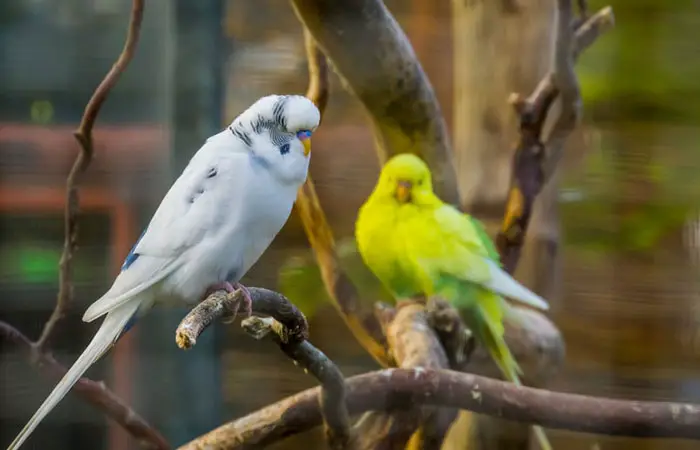
Positive reinforcement and training can be an effective bird behavior management strategy to prevent feather plucking. The steps include
- Start with simple bird behaviors like perching or stepping up onto your finger
- Use Positive Reinforcement by rewarding good behavior to encourage continuity
- Use a Clicker for Training to make a clicking noise when your budgie behaves appropriately, followed by a reward such as a treat
- Be Consistent by using the same commands and rewards when training your budgie
- Avoid Punishment that can cause fear and stress in your budgie
How To Use Bird Grooming Products To Promote Healthy Feather Growth And Prevent Feather Plucking
Bird grooming products can be an effective tool for promoting healthy bird behavior and preventing feather plucking in budgies. Here are some tips on how to use these products effectively.
- Use a shallow dish or bird bath specifically designed for birds to offer your bird a regular bath
- Use a supplement or vitamin that is specifically formulated for birds, and follow the recommended dosage carefully
- Provide a healthy diet
- Keep your bird’s surroundings clean
FAQs
Here are a few more additional questions you might be asking now.
Yes, it can be contagious to other birds or humans if it is caused by a contagious disease or mite infestation.
Yes, budgies can grow new feathers after they have been plucked. It takes 4-6 weeks for new feathers to grow, depending on the bird’s health, age, and environment.
Improvements can be observed through the regrowth of feathers and a reduction in bald patches. If the behavior persists or worsens, seek veterinary care to identify and address the underlying cause.
Yes, medication or surgery may be used to treat feather plucking in budgies, depending on the underlying cause.
Not sure. Introducing a second bird to a budgie’s environment may or may not prevent feather-plucking behavior.
Conclusion
Feather plucking is a common behavior in budgies that can be caused by various factors. This includes stress, boredom, or underlying health conditions. Proper care and management are crucial in preventing and managing this behavior in budgies.
It is important to provide a balanced and nutritious diet, maintain a clean and stimulating environment, and address any underlying health conditions, as explained.
Additionally, socialization, habituation, and desensitization are techniques for managing stress and anxiety in budgies. They can also contribute to feather-plucking behavior.
Preventing and managing feather-plucking behavior in budgies requires a multifaceted approach that involves providing proper care, identifying and addressing potential triggers, and using behavior modification techniques.
By implementing these strategies and seeking veterinary care when necessary, you can help promote healthy bird behavior and well-being. For further reading and resources on budgie behavior and care, consider consulting with a reputable avian veterinarian or exploring credible online sources.
